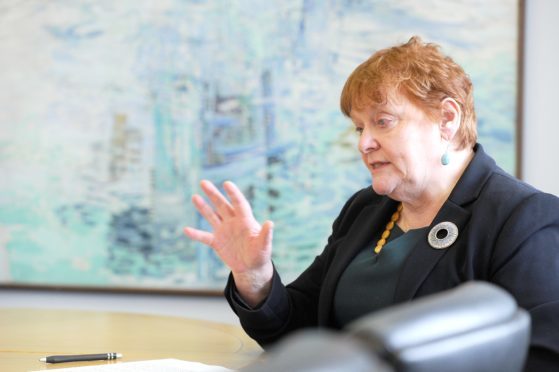Local authority leaders in the north and north-east have joined forces to demand urgent action to survive the “perfect storm” facing council finances.
Top councillors spoke out after a report by Unison and the Jimmy Reid Foundation last week called for a “fundamental review” of funding, including council tax.
Last night, Highland Council leader Margaret Davidson said talks must get underway imminently on a radical shake-up of the system.
“We really do need a fundamental review about how we raise money for local services, and I’d like the government to take that seriously. We need a different way of raising money for local services,” she said
“We’ve got a lot of talking to do about this, but I’m not hearing the serious discussions we need. We need some sort of symposium, follow-up workshops, and considerable discussions about how we do that.”
She added: “We’ve got a perfect storm at the moment. Last year we had a further reducing settlement from the government, loan repayments which we had to pay – and what you get is increasing demand in a lot of areas.
“What you get is substantial overspends, and then you have to rein your services back in, slow things down or stop doing things. We’ve been looking at this for some time.”
Jenny Laing, co-leader of Aberdeen City Council, said: “It is clear that we must reform council tax as the current financial model for local government is unsustainable.
“Cities are the powerhouse of the Scottish economy and councils like Aberdeen, need to be provided with the powers to stimulate inclusive economic growth which will in turn allow the wider city regions to flourish.
“Whilst a Land Value Tax is certainly worth exploring we would need to ensure that the criteria of the scheme take revaluation into account.”
She added: “If the Scottish Government are serious about empowering communities, they must devolve more powers to local authorities.”
Argyll and Bute Council leader Aileen Morton said: “A meaningful discussion about funding in the future and exploring ways of turning this around would be welcome, but councils really need to be part of those conversations, to have parity of esteem.
“New fiscal powers such as those proposed in the report can only empower councils if they provide the level of funding required to deliver core services and meet the expectations of local communities.”
Western Isles Council leader Roddie Mackay said: “The Comhairle would welcome to opportunity to contribute to the debate on local taxation but would wish to see decisions on matters such as Tourist Tax, and rates relief determined locally, recognising that a one size fits all approach is not appropriate for the whole of Scotland.”
Alison Evison, an Aberdeenshire councillor and president of council body Cosla, said: “Cosla believes that there needs to be a fundamental review of local government finance.
“We need to be innovative about funding for public services, and empower local authorities with the financial sustainability and levers they need.
“Councils must be able to deliver essential services to their communities while following Fair Work principles. They need to have the discretion to raise additional funding to respond to the identified aspirations of their diverse local communities.”
A Scottish Government spokesman said: “The package of local tax reform measures announced at the Budget will deliver the most significant empowerment of local authorities since devolution.
“This year we will formally consult on the principles of a locally determined tourist tax, in addition to supporting a Green amendment to the Transport Bill that would allow councils to choose whether they wished to introduce a workplace parking levy.
“We will also devolve Non-Domestic Rates empty property relief to local authorities in time for the next revaluation in April 2022 and convene cross-party talks on replacing the current council tax.”
